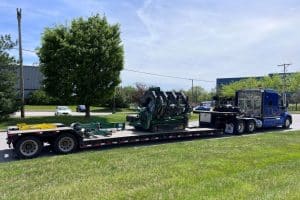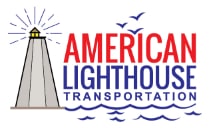
Defining Heavy Haul: Thresholds and Dimensions
At the outset, it’s crucial to understand what constitutes a “heavy haul” shipment. While the definitions may vary across state lines, there are some general guidelines that help delineate this category. Typically, a load is considered a heavy haul if it exceeds any of the following dimensions: 14 feet, 6 inches in height; 14 feet, 6 inches in width; or 100 feet in length. Additionally, any single dimension that surpasses 16 feet, whether in height or width, would also fall under the heavy haul classification.
In terms of weight, the threshold for a heavy haul shipment is generally set at 55,000 pounds or more for the overall piece weight. Loads that exceed this limit require additional axles and specialized equipment to ensure safe transport, further distinguishing them from standard freight movements.
The Specialized Equipment of Heavy Hauling
To accommodate the unique dimensions and extraordinary weights of heavy haul cargo, the transportation industry has developed a range of specialized trailers and tractor configurations. These include:
Removable Gooseneck Trailers (RGNs)
Designed to handle oversized loads, RGN trailers feature a detachable front section, allowing for easier navigation around tight turns and under low-clearance obstacles.
Extendable RGNs
Building upon the versatility of RGNs, these trailers can be extended to accommodate even longer loads, further expanding the range of cargo that can be transported.
Flatbed, Step-Deck, and Double-Drop Trailers
These trailer types, often equipped with extendable platforms, are well-suited for hauling a variety of oversized and heavy items, from construction equipment to industrial machinery.
Lowboy Trailers with Outriggers
Lowboy trailers, with their low-profile design, are commonly used for transporting exceptionally tall loads, such as excavators or other heavy machinery. Outriggers are added to provide additional stability and support.
As the weight of the cargo increases, the trailer configuration must adapt accordingly. Typically, loads exceeding 50,000 pounds will require a minimum of six axles to distribute the weight effectively, with some of the heaviest shipments necessitating the use of jeeps, stingers, and even more specialized multi-axle arrangements.
The Intricacies of Heavy Haul Trucking
While the physical movement of heavy haul cargo is a significant challenge, the complexities of this specialized transportation field extend far beyond the equipment and logistics. Heavy haul trucking requires a multifaceted approach that addresses a range of critical considerations:
Experienced and Trained Drivers
Driving oversized and overweight loads demands a unique set of skills and expertise. Heavy haul trucking companies meticulously vet their drivers, ensuring they have the necessary training, experience, and specialized licenses to navigate the complexities of these shipments safely.
Route Planning and Route Surveys
The route of a heavy haul shipment is of paramount importance, as it can significantly impact the cost and feasibility of the transport. Experienced carriers work closely with state and local authorities to plan the most efficient and permissible route, often conducting detailed route surveys to identify any potential obstacles or restrictions.
Permitting and Regulatory Compliance
Heavy haul shipments require extensive permitting, as the cargo often exceeds the standard legal dimensions and weight limits for roads and highways. Navigating the complex web of state, county, and municipal regulations is a crucial aspect of heavy haul trucking, with carriers working closely with authorities to ensure full compliance.
Safety Services and Coordination
Transporting heavy, oversized loads often requires the involvement of various safety service providers, such as pilot car services, utility professionals, and even law enforcement escorts. Coordinating these specialized services is a key responsibility of heavy haul carriers, ensuring the safe and secure movement of the cargo.
The Cost of Heavy Haul Trucking
Determining the cost of a heavy haul shipment can be a complex endeavor, as it is influenced by a multitude of factors. Generally, shippers can expect to pay between $5 and $10 per mile, plus fuel costs, for heavy haul services. However, this range can vary significantly depending on the specific characteristics of the load, the required equipment, the route, and the necessary permits and safety services.
For loads under 100,000 pounds, a simple formula can be used to estimate the cost: multiplying the number of axles required by $1 and then multiplying that figure by the length of the haul. This method, while effective for smaller heavy haul shipments, becomes less reliable as the overall weight of the cargo increases, underscoring the importance of working closely with experienced heavy haul providers to obtain accurate cost estimates.
The Challenges and Rewards of a Heavy Haul Career
Navigating the world of heavy haul trucking requires a unique set of skills and a deep understanding of the industry’s intricacies. Drivers who excel in this field must possess exceptional maneuvering abilities, a keen eye for route planning, and the patience to navigate the complex permitting and regulatory landscape.
The rewards, however, can be substantial. Heavy haul trucking offers competitive salaries, with experienced drivers often earning upwards of $75,000 per year. Additionally, the sense of accomplishment that comes from successfully transporting colossal, one-of-a-kind cargo can be immensely gratifying.
The Future of Heavy Haul Trucking
The passage of a robust federal infrastructure bill has further fueled this growth, as investments in roads, bridges, and other critical infrastructure will require the expertise of specialized heavy haul carriers. Furthermore, the ongoing energy boom and the increasing need to transport oversized equipment, such as wind turbine components and mining machinery, are driving the heavy haul industry forward. As a result, the heavy haul trucking market is projected to experience a compound annual growth rate of approximately 7.34% between 2021 and 2026, underscoring the industry’s resilience and promising future.
Navigating the Heavy Haul Landscape: Tips for Shippers
For shippers navigating the complexities of heavy haul transportation, it is crucial to partner with experienced and reliable carriers. Factors to consider when selecting a heavy haul provider include their safety record, fleet capabilities, permitting expertise, and track record of successful oversized and overweight deliveries.
To assist shippers in this process, many industry-leading carriers have developed comprehensive checklists and resources to guide the selection of the right heavy haul partner. By leveraging these tools and working closely with carriers, shippers can ensure that their heavy haul shipments are handled with the utmost care and professionalism, mitigating risks and maximizing the chances of a seamless delivery.
American Lighthouse Transportation Can Haul Your Heavy Loads!
You can depend on our experienced and knowledgeable management team, drivers, and support to make sure your shipment arrives safely, accurately, and on-time!
> View Some of Our Latest Hauls
The world of heavy haul trucking is a captivating and challenging realm, where the movement of colossal cargo requires a unique blend of specialized equipment, meticulous planning, and highly skilled professionals. As the demand for heavy haul services continues to grow, driven by infrastructure investments and the ongoing energy and construction booms, this specialized transportation field is poised to play an increasingly vital role in the efficient movement of goods across the nation.
Contact Us (859) 824-4177 for more information or to get a quote!
—

About American Lighthouse Transportation
American Lighthouse Transportation has been serving shippers with honesty and integrity throughout the United States, since 1998. You can depend on our experienced and knowledgeable management team, drivers, and support for all your shipping needs. We communicate effectively to make sure your shipment arrives safely, accurately, and on-time! You can count on us for personalized customer service, expert guidance, accurate anticipation of potential setbacks, and possible workarounds and solutions.
>> Learn More